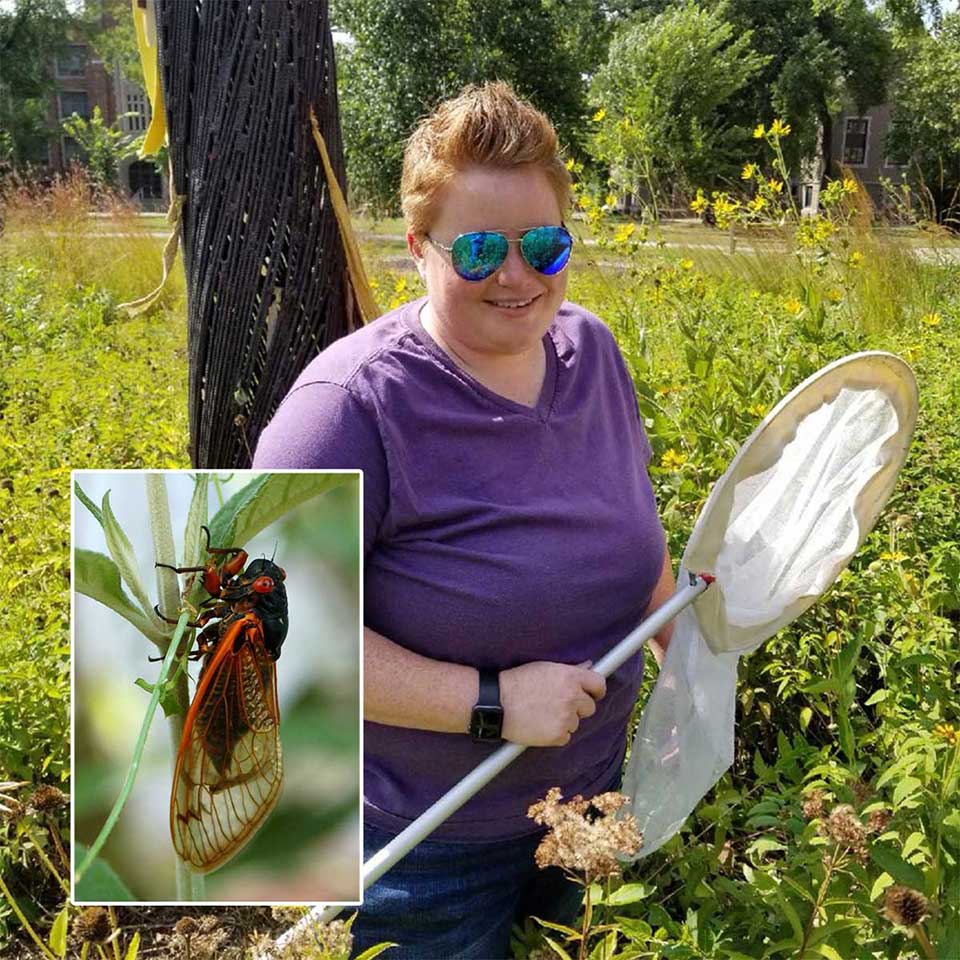MGA Faculty Q&A With Dr. Melissa Sisson: The Buzz On “Cicada-Geddon”
Author: Sheron Smith
Posted: Monday, April 8, 2024 12:00 AM
Categories:
School of Health and Natural Sciences | Faculty/Staff | Pressroom
Cochran, GA

Dr. Melissa Sisson, shown during a field research trip, and, in the inset, a Great Southern Brood cicada.
As described by the publication Scientific American, two adjacent broods of periodical cicadas will emerge this spring in the eastern half of the U.S. These insects “crawl out of the ground once every 13 or 17 years for a rush of mating and egg-laying until all the adults die, and the next generation is tucked underground until their own teenage years.” This year, in a rare phenomenon, both a 13-year brood and a 17-year brood will emerge across adjoining territories. Some are calling the upcoming appearance of these two broods, and the exceptionally loud buzzing sound they will make, “cicada-geddon.” For more, we turn to Dr. Melissa Sisson, an assistant professor in the Department of Natural Sciences.
What exactly is cicada-geddon? Tell us more about the two broods that are emerging.
Cicada-geddon is an emergence of cicadas that have not been seen in decades. However, in this case there are two different broods that will be emerging at the same time in the coming weeks. The two emerging broods are the Northern Illinois Brood (aka Brood XIII) and the Great Southern Brood (aka Brood XIX). The Northern Illinois Brood emerges every 17 years, essentially adults will tunnel from underground to the surface in which they will mate and lay eggs, while the Great Southern Brood emerges every 13 years. Any cicada emergence typically lasts weeks then the cicadas will die off.
When can we expect cicada-geddon to begin and how much will it impact this region?
We’ll probably begin to notice in late April. Here in Middle Georgia, we will likely see members of the Great Southern Brood. Of the two broods they have the largest geographic range, ranging from Missouri to Georgia. The Northern Illinois Brood on the other hand has a much smaller range of Illinois, Iowa, and Wisconsin. While it may not impact humans here in Middle Georgia, the emergence will have a huge impact on organisms that feed on cicadas.
How do cicadas synchronize their emergence after spending so many years underground?
They don’t necessarily synchronize their emergences. Instead, this upcoming double emergence is a rare event that was last witnessed in the early 1800s. There are cicadas that are known as periodical cicadas, this is when they are maturing for a number of years. This maturation time varies depending on the batch or brood, there are some broods that only emerge every 24 years.
In what ways do cicada-geddon events offer opportunities for scientific study and ecological research?
There would be a number of questions that could be asked, such as how these emergent events impact forest ecosystems. Since cicadas lay their eggs on trees these impacts could have a drastic impact on the forest ecosystems, especially forests with young trees.
What do cicadas during a cicada-geddon event typically sound like, and how loud can we expect it to get?
It can get quite loud in wooded areas. Cicadas look for vegetation near trees, this is where they will mate and their eggs. So, if you are in a densely wooded area, it would be much louder than an open area. Experts have estimated that in these wooded areas with potentially hundreds of cicadas all looking for mates the sound range is up to 110 decibels.
Are there any particular locations where cicada emergences are more intense, and what's the best way for people to witness them?
Wooded areas would probably be the best. I would suggest to anyone that heads out to wooded areas to witness this event to take ear protection just in case.